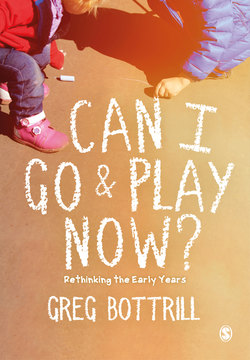Читать книгу Can I Go and Play Now? - Greg Bottrill - Страница 14
На сайте Литреса книга снята с продажи.
Education needs people who have pedagogy at the heart of their desire to be a teacher
ОглавлениеYour own personal belief is vital for you to be a truly effective practitioner. Too often we see schools that are driven by a hunger for data outcomes and not by the children’s best interests or personal development.
Early Years must resist the top-down mentality of seeing children as product and as outcome. Early Years holds the key to successful child development. However, nine times out of ten we see the immediate closedown of this in its truest sense once children arrive in the Year 1 classroom. It takes a brave heart and mind of school leadership to see children being truly enabled in Key Stage 1. School is and has always been a top-down pyramid where Year 6 and often the Year 6 teacher’s attitudes filter down. This often leads to children being compartmentalised, boxed up and factory-ised because leadership doesn’t understand Early Years. It is frequently the case that a general teaching degree places very little emphasis on Early Years. There’s a perception that Early Years isn’t ‘proper’ teaching.
This immediately creates a barrier between the worlds of Key Stage 2/Key Stage 1 and Early Years. Early Years somehow becomes something different and other worldly. It transfers itself unfortunately into the workplace once students become teachers. All too often teachers say, ‘Well, it’s just Early Years, they soon grow out of it, play isn’t learning, they’ll start proper school in Year 1.’
The tragedy of this is that it gets passed on to parents who then begin to see Year 1 as proper school or where their children begin to learn. This has a huge impact on how Early Years is perceived. What needs to occur is a revelation that Early Years and its practice is the most important time of a child’s school life and one in which they will do their crucial learning. By ‘learning’ I mean their perception of what school is, what teachers are and, most importantly, who they, as children, are and what they can achieve. Since we are seemingly hell bent on grading, classifying, assessing, judging and measuring children, it would perhaps seem that there is a picture of a somewhat hopeless cause. This is far from the truth – as Early Years practitioners we need to begin to make our voices heard.
‘We wanna be free, we wanna be free to do what we wanna do ... we wanna have a good time and that’s what we’re going to do!’ – The Wild Angels (1966)
If freedom comes from listening to children’s voices, then we have to prepare ourselves to listen. We have to create the conditions for children to be heard. We need to fashion the space within our own adult minds to ensure that this can happen. In short, we need to let go.
If our children are really to have their voices heard, then we need to ensure that we are not blocking the airwaves with what we perceive to be their best interests, with what we want or need them to learn.
